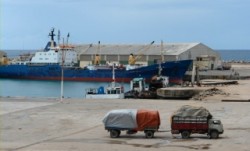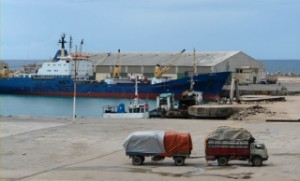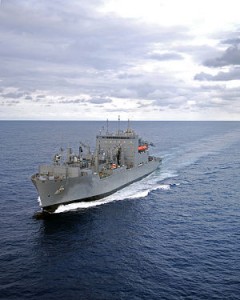International Maritime Satire Week Warning: The following is a piece of fiction intended to elicit insight through the use of satire and written by those who do not make a living being funny – so it’s not serious and very well might not be funny.
In what is being hailed as a new direction for Russian defense, President Vladimir Putin announced today that Russia is launching a massive naval construction program with the goal of developing an absolutely huge navy. At 518 vessels in service, Putin declared the Russian Federation Navy far too small to meet Russian security needs.
Speaking at a press conference held at Admiralty Shipyard in St Petersburg, the Russian president said the proposed funding binge on the navy was an entirely novel idea and neccesary to protect the nation’s shores and foreign interests from its many enemies.
“Russia is a maritime state,” said Putin, dripping with seawater after single-handidly recovering the remains of an 18th-century shipwreck on a dive. “It is puzzling that never before has Russia developed a large navy like we are planning. We will add over one thousand ships to our fleet to protect our shores against foreign threats and secure our trade and ocean resources.”
“This is an unprecedented buildup of naval forces for the Russian state,” he continued, towelling off before mounting a brilliant white stallion, bare-chested. “But it is appropriate.”

Documents released ahead of the press conference shed greater light on the details of Russia’s shipbuilding program. The plan calls for an additional 1,114 ships to be built over the next 15 years, with hundreds of new attack submarines and surface ships. Russia’s sea-based nuclear deterrent will also be recapitalized. Once completed, the ships will be spread equally among the four existing fleets of the Russian Federation Navy – Baltic, Black Sea, Pacific, and Northern.
Russian government officials were quick to offer their support for the program.
“This is definately a sustainable level of naval power that our growing economy and population can support,” said Admiral Viktor Chirkov, commander-in-chief of the soon-to-be enlarged Russian Federation Navy. “We were just sitting around befuddled, trying to figure out how we could defend our fisheries, oil, and overseas trade with only 500 ships, when the President came up with this plan to build a lot more ships. It’s brilliant! And it is only natural that we have a navy capable of defending these assets. Anything less than 1,000 ships is preposterous – I can’t believe we haven’t been invaded already!”
Russian Prime Minister Dmitry Medvedev offered another justification for the new policy.
“America, a continental state, is bordered by only two oceans and one gulf. Russia faces two oceans and three seas. If a continental state like the United States can have a huge navy, why cannot a maritime state like Russia?”

In Washington, D.C., U.S. officials were skeptical of the Russian government’s new plans.
“There is no conceivable need for Russia to have such a large navy,” said U.S. Chief of Naval Operations Admiral Jonathan Greenert, questioning the economic rationale for the Russian government’s new shipbuilding plans.
“The Russians don’t engage in all that much trade, and what they do, they do with the countries they share land borders with, like EU members or Central Asian states.”
Greenert also questioned the novelty of the program.
“What are they talking about, ‘new policy,’?” he asked. “The Soviet Union had a massive fleet when it collapsed just over twenty years ago. The huge naval build-up that the Soviet Union conducted was one of the reasons its economy stagnated and communism collapsed. Are these guys suffering collective amnesia?”
“I mean, I spent the first 15 years of my career in submarines chasing their ships around the world. There were tons of them.”
Asked for comments, Chirkov found Greenert’s claims less than convincing.
“If we had built a huge navy, why is it not around today? No one builds an enormous navy and then just lets it fall to pieces,” said Chirkov. “Such claim is ridiculous. Russia has never had a big navy. This is an unprecedented new policy, and a reasonable size given the strength of Russia’s economy and its position of global influence.”
In a related announcement, Defense Minister Anatoliy Serdyukov said the Ministry of Defense was investigating the creation of a fifth, mobile fleet. “We are calling it the Ocean-Going Fleet,” Serdyukov said. “The idea has never been studied before, and its development would truly be an innovation. This study demonstrates President Putin’s commitment to a strong national defense. It is an untested idea, but we are confident the Navy could execute it exceedingly well – even if we have no historical models upon which to draw lessons.”








